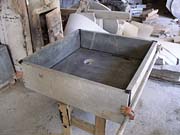

Thompson, who has a marketing background, worked for another Vermont stone supplier before starting his own venture three years ago. Located in the fashionable ski village of Killington, VT, Vermont Marble, Granite, Slate & Soapstone's showroom showcases a full range of soapstone products, including sinks, countertops and cookware. It also imports woodburning masonry heaters made of soapstone from Willach of Germany. The company's soapstone products have their own marketing arm, “Soapstone Depot,†complete with a Web site at www.soapstonedepot.com. Soapstone countertops and sinks are fabricated at the company's shop in nearby Castleton, VT, and other items are imported as finished products. The soapstone sinks feature a classic tongue-and-groove assembly where applicable, and the company also offers solid, carved one-piece sinks. The sinks are available in styles such as the “Philadelphia Pitched Front,†the “New England Double Bowl†and the “Solid Vermonter,†among other varieties.
Soapstone slabs are imported in sizes as large as 8 x 5 feet, and they are typically honed to a 320-grit finish. “Soapstone is known as a grayish/blue concrete-looking material, but soapstones have different veining and characteristics,†Thompson explained, saying that many of the slabs fall into a light green range. Soapstone slab varieties in stock include Verde Venatino, Meadowbrook, Classic Original and Rio Blue. The color of the slab darkens by increasing the hone level, and the addition of oil can also change the surface color of the stone.
The main components of soapstone are magnesite and talc, Thompson said, adding that it can expand and contract without breaking. The characteristics of soapstone make it useful in the home, as it can be heated and retains heat for stoves and cookware. It can also be chilled and retain the cold for dinnerware products such as salad bowls. Reaching out directly to the retail market, the company's line of kitchen products can be found at www.temperatureware.com.
For soapstone countertops, Vermont Marble, Granite, Slate & Soapstone Co. uses a topical sealer, since impregnators will not penetrate. Thompson explained that the soapstone quarries in Brazil are different than traditional marble or granite quarries, as they are smaller in size, with less reserves. This makes finding a reliable supplier more of a challenge, but it gives the company a competitive advantage since it has already developed an importing and distribution network. “Soapstone is distributed across the country, in sinks, slabs and bundles,†Thompson said. “We're trying not to saturate any one region, so we like to have one or two good distributors in a given area.â€
In addition to soapstone, the company sells Vermont marble, granite and slate, and it also fabricates more “common†varieties of granite and marble, which it brings in from distributors on the East Coast. For this portion of the business, Thompson went to major stone distributors in the New York/New Jersey area, such as ABC Worldwide, IGM-International Granite & Marble, and OHM, and began building a library of samples.
The Castleton plant has a total of six workers, and the company does templating, fabricating and installation. The company's client base goes well beyond Vermont, as it spans much of the Northeast from Philadelphia to Boston. At the time of Stone World's visit, the crew was busy finishing work on a major kitchen project -- with Vermont Cavendish Green counters and a Vermont slate hearth -- in Princeton, NJ.
In the shop, stone is cut with an Achilli Mini Bridge Saw (MBS), and the edgework is completed with a range of hand tools, including units from DeWalt and Makita. Tooling is purchased from GranQuartz.
Thompson estimates that 70 to 80% of the company's business is soapstone, and he said that this material offers him an entry to market other stones. “It's hard for me to go against a guy in Boston who has been doing this for 25 years,†he said. “Soapstone gives us an entry into that business.â€